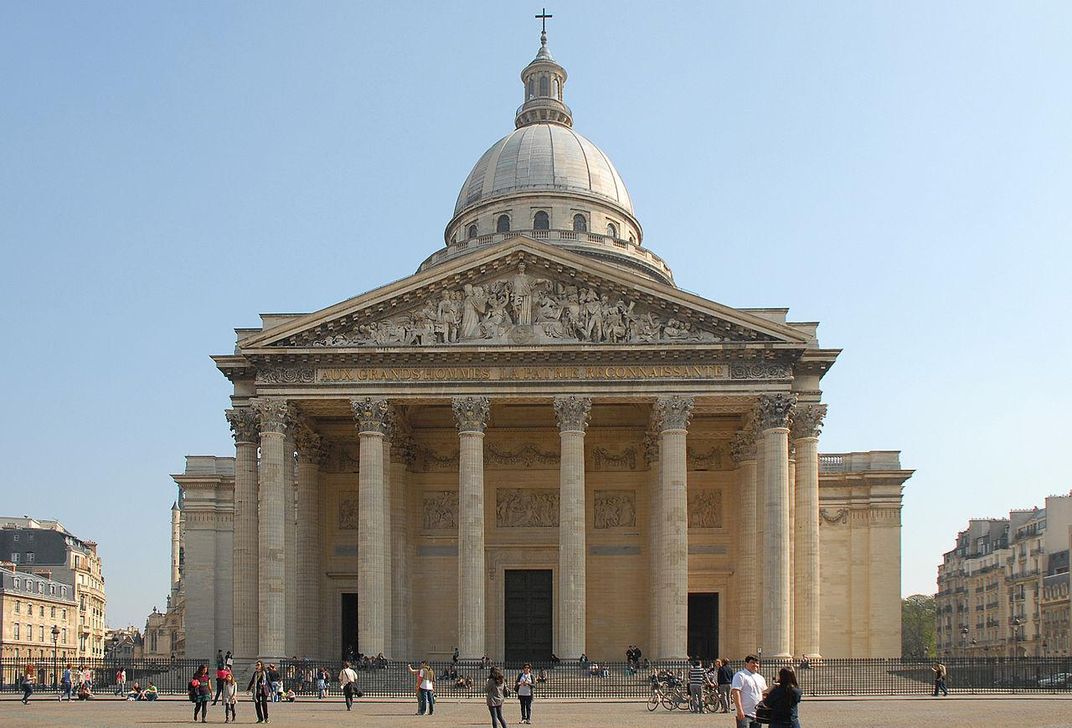Performer Josephine Baker to Be First Black Woman Buried at Paris’ Panthéon
The talented entertainer, activist and spy will be the fifth woman accorded one of France’s highest honors
:focal(1771x1063:1772x1064)/https://tf-cmsv2-smithsonianmag-media.s3.amazonaws.com/filer/8e/16/8e1629ec-f76d-439e-8d1d-3dca9afa742b/gettyimages-3229575.jpg)
Singer, dancer and activist Josephine Baker is set to become the first Black woman buried in Paris’ Panthéon monument, receiving one of the highest honors bestowed on French citizens, reports Olivier Beaumont for French newspaper Le Parisien.
Authorities plan to reinter Baker’s remains in a November 30 ceremony, reports the Associated Press (AP). At the Panthéon, the performer will rest alongside such prominent figures as boundary-breaking scientist Marie Curie, writer Victor Hugo and philosopher Voltaire. Baker, who died in 1975 at age 68, is only the fifth woman to be buried at the iconic landmark; comparatively, 72 men have received the honor to date.
The government’s announcement arrives two years after French writer Laurent Kupferman created a petition calling for Baker’s reinterment in the Panthéon. The online form garnered nearly 40,000 signatures, reports Constant Méheut for the New York Times.
As a world-famous entertainer, committed civil rights advocate and key player in the French Resistance against Nazi Germany during World War II, Baker represents “the embodiment of the French spirit,” says the Elysée Palace, official residence of French president Emmanuel Macron, in a statement.
Born in St. Louis, Missouri, in 1906, Baker worked her way out of poverty by performing in successful vaudeville acts across the country. Per the Smithsonian’s National Museum of African American History and Culture (NMAAHC), she moved to France in 1925 as part of La Revue Nègre’s musical and dance ensemble.
Baker’s career “skyrocketed” in France, in part because she had access to more opportunities abroad than she did in the segregated American South, notes NMAAHC.
“Josephine Baker embodies the [French] Republic of possibilities,” Kupferman tells the Times. “How could a woman who came from a discriminated and very poor background achieve her destiny and become a world star? That was possible in France at a time when it was not in the United States.”
Known for her glamorous fashion and provocative Jazz Age music hall routines, Baker broke barriers as one of the first Black female entertainers to achieve mainstream stardom. She became the first African American woman to star in a major motion picture, the French silent film Siren of the Tropics (1927).
Baker became a French citizen in 1937, when she married industrialist Jean Lion, reports BBC News. During World War II, she served as a member of the French resistance, transmitting secret information to Allied Forces and hiding refugees in her Paris home. These efforts earned her the Croix de Guerre and the Legion of Honor—two of France’s highest military honors, as Christopher Klein reported for History.com in March. Buried in Monaco upon her death in 1975, Baker was laid to rest with her medals, dressed in full military uniform.
Over the course of her career, Baker emerged as a vocal advocate for equality, refusing to perform in front of segregated audiences in the Jim Crow–era South and touring the United States to promote the civil rights movement. At the March on Washington for Jobs and Freedom in 1963, Baker was the sole female speaker to deliver an address alongside Martin Luther King Jr., as Jessica Goldstein reported for the Washington Post in 2011.
“I have walked into the palaces of kings and queens and into the houses of presidents,” said Baker in her speech. “… But I could not walk into a hotel in America and get a cup of coffee, and that made me mad.”
The performer went on to urge the crowd of about 250,000 people to speak out against injustice.
“I am not a young woman now, friends. ... There is not too much fire burning inside me,” she said, “[but] before it goes out, I want you to use what is left to light the fire in you.”
/https://tf-cmsv2-smithsonianmag-media.s3.amazonaws.com/accounts/headshot/nora.png)


/https://tf-cmsv2-smithsonianmag-media.s3.amazonaws.com/filer/fb/92/fb929c12-59c4-4c65-8807-215dab6c6e6a/npg-npg_95_105baker-000001_1.jpg)
/https://tf-cmsv2-smithsonianmag-media.s3.amazonaws.com/filer/8c/4e/8c4ec0aa-66e0-4c65-8b2c-7a0050b08447/baker_harcourt_1940.jpg)

/https://tf-cmsv2-smithsonianmag-media.s3.amazonaws.com/accounts/headshot/nora.png)